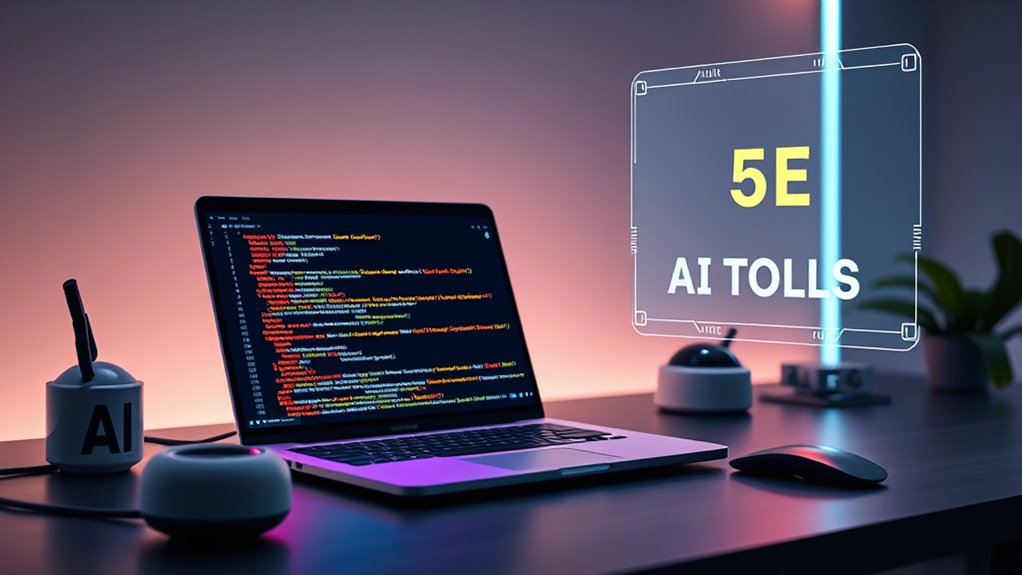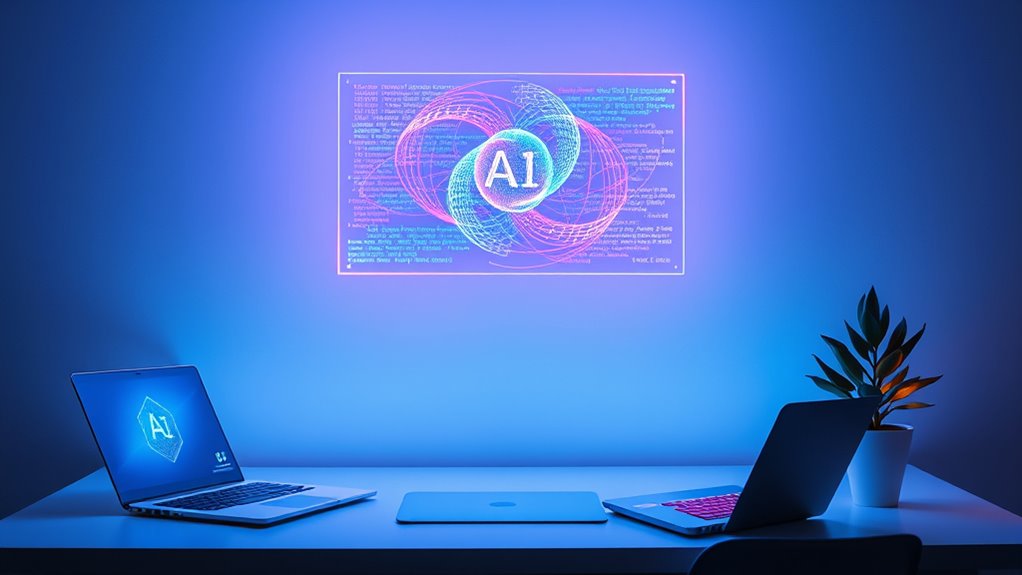In 2025, you’ll want to leverage AI tools like Qodo for advanced full-stack code generation, and OpenAI Codex to effortlessly convert natural language into code. Replit enhances teamwork with its real-time collaboration features. For security, DeepCode provides AI-driven vulnerability detection, while Snyk offers real-time analysis to improve your code’s safety. These tools will elevate your vibe coding experience considerably. To discover how each tool can benefit you further, explore the specifics of their capabilities.
Key Takeaways
- Qodo offers advanced full-stack code generation, ensuring seamless backend and frontend synchronization for cohesive projects in vibe coding environments.
- OpenAI Codex excels in converting natural language to executable code, enhancing productivity and simplifying complex coding tasks for developers.
- Replit enables real-time collaboration and supports over 50 programming languages, making it ideal for team-based vibe coding projects.
- DeepCode provides AI-driven code analysis that detects vulnerabilities and complex bugs, essential for maintaining robust security in coding practices.
- Snyk enhances security through real-time vulnerability analysis, promoting shift-left security practices that align with modern vibe coding methodologies.
Qodo: Advanced Full-Stack Code Generation

When you’re diving into full-stack development, Qodo stands out with its advanced code generation capabilities. You’ll appreciate its end-to-end feature generation for both frontend and backend, making your projects more cohesive. Additionally, this innovative tool leverages AI-driven solutions to enhance the coding experience significantly. High refresh rates in gaming projectors can enhance your overall development experience by allowing smooth transitions and visuals. The spirit of adventure in exploration can be a guiding principle as you tackle complex coding challenges.
Real-time team collaboration fosters effective communication, ensuring everyone’s on the same page. Plus, Qodo’s advanced context recognition tailors code generation to meet your project’s specific needs. An emphasis on continuous learning can further empower developers to adapt and thrive in a fast-evolving tech landscape.
You can expect seamless synchronization between the backend and frontend, streamlining your development process. Automatic code quality checks further enhance your output, ensuring robust and maintainable code. The role of color accuracy is essential in ensuring that your application’s visuals are represented accurately across different devices.
With compatibility across multiple IDEs, you won’t face hurdles in integrating Qodo into your workflow. It truly optimizes your full-stack experience, making coding efficient and error-free. Additionally, maintaining air quality considerations during development can lead to a more productive environment.
OpenAI Codex: Natural Language to Code Conversion

OpenAI Codex revolutionizes coding by transforming natural language into executable code, making it easier for developers to bring their ideas to life.
As a descendant of GPT-3, Codex specializes in coding applications, generating clean, well-structured code in various languages like Python, JavaScript, and Ruby. This AI model enhances your productivity by automating parts of the development process, greatly speeding up coding tasks. Additionally, using freshly squeezed juices can keep you refreshed and focused while coding. Heat pumps, particularly energy-efficient models, can also significantly reduce heating and cooling costs, which is essential for maintaining a comfortable working environment. Moreover, embracing sustainable practices in your coding and development processes can lead to more eco-friendly outcomes. Furthermore, the integration of predictive modeling can help developers better understand coding patterns and optimize their workflow based on historical data.
Codex also reduces errors and manages complex code generation, such as SQL queries. Integrated seamlessly with popular IDEs like Visual Studio Code, it offers real-time code suggestions through GitHub Copilot, boosting your coding speed by up to 55%.
Codex minimizes errors and simplifies complex code tasks, enhancing coding efficiency with real-time suggestions in popular IDEs.
With its adaptable capabilities, Codex is a game-changer for developers aiming for efficiency. Additionally, its ability to automate support through chatbots offers significant advantages in enhancing user experiences during the coding process.
Replit: Real-Time Collaboration and Code Generation

Replit transforms the coding experience by enabling real-time collaboration among developers, making teamwork more efficient than ever. You can code alongside your teammates, seeing changes unfold instantly through live cursors, much like Google Docs.
Instant feedback through secure link sharing enhances your collaborative efforts, while operational transformations guarantee smooth merging of changes. With AI-powered tools, you’ll receive auto-completion suggestions and debugging assistance, boosting your productivity. Additionally, the integration of robust safety measures ensures that your collaborative coding environment remains secure and reliable.
Replit supports over 50 programming languages, so you can easily switch between projects. It’s perfect for rapid prototyping, educational settings, and pair programming, fostering shared learning and skill exchange.
You can access your projects from any browser, eliminating local setup hassles, allowing you to code wherever you are. Additionally, the integration of AI algorithms enhances the coding experience by providing personalized suggestions tailored to your coding style.
DeepCode: Code Analysis and Vulnerability Detection

DeepCode revolutionizes the way developers approach code quality by leveraging AI-driven analysis for bug detection and vulnerability identification.
This powerful tool analyzes your code in real-time, pinpointing complex bugs and security vulnerabilities you might overlook. Supporting languages like Java, JavaScript, Python, TypeScript, and C/C++, DeepCode integrates seamlessly with IDEs and popular repositories like GitHub and GitLab. Additionally, the increasing interest in alternative investments reflects a broader trend towards valuing security and quality in various domains, including software development. Implementing encryption solutions in your applications not only enhances data security but also fortifies your code against potential threats. Furthermore, the tool benefits from continuous advancements in algorithms that improve predictive capabilities, making it even more effective. Moreover, understanding filial responsibility laws can guide developers in planning for financial support during later stages of life, enhancing the overall security of their projects.
Its machine learning algorithms continuously improve, offering you enhanced security insights and actionable fixes. By automating bug detection and providing clear explanations, DeepCode boosts your productivity, allowing you to focus on development.
With its compatibility in CI/CD pipelines, it fits perfectly into your existing workflows, ensuring your software remains secure and efficient. Additionally, by employing predictive analytics, DeepCode helps anticipate potential vulnerabilities before they can be exploited, enhancing your overall security posture.
Snyk: AI-Powered Security Analysis and Code Improvement

Snyk is transforming the landscape of application security with its AI-powered tools designed for real-time analysis and code improvement.
You’ll appreciate how Snyk enhances your DevSecOps processes with AI-driven features, including reachability analysis to spot vulnerabilities in open-source components effectively. Its real-time security capabilities tackle issues swiftly, reducing time spent on fixes. By implementing self-care routines, teams can ensure they remain energized and focused during the development process. As AI capabilities evolve, they are increasingly exceeding human abilities, which highlights the importance of integrating advanced technologies like Snyk into your security strategy. The rise of cybersecurity vulnerabilities during global outages underscores the need for robust solutions like Snyk. Furthermore, advancements in quantum computing are expected to enhance encryption methods, bolstering application security.
With self-hosted AI models, Snyk addresses data privacy concerns while providing thorough analytics that offer insights into your organization’s security posture.
Snyk’s self-hosted AI models ensure data privacy while delivering comprehensive insights into your organization’s security posture.
The integration with tools like Dynatrace and Nightfall AI guarantees a holistic view of application risks, prioritizing vulnerabilities based on contextual data. This proactive approach to risk management supports your shift-left security practices, empowering you to secure applications right from development, while also leveraging data-driven insights to enhance overall security effectiveness.
Frequently Asked Questions
Can I Integrate These Tools With My Existing Development Environment?
Yes, you can integrate these tools with your existing development environment. Each tool offers various integration capabilities, making it easy for you to incorporate them into your workflow.
For example, Qodo and Replit allow seamless integration with multiple frameworks, while OpenAI Codex connects smoothly with popular IDEs.
You’ll find that many tools support different programming languages, ensuring compatibility and scalability, so you can enhance your development process effectively.
Are These AI Tools Suitable for Beginners in Programming?
Yes, these AI tools are definitely suitable for you as a beginner in programming. They offer user-friendly interfaces, intelligent code completion, and educational resources that help you learn effectively.
Tools like Replit and Qodo provide real-time collaboration and templates, while OpenAI Codex supports natural language coding.
With their extensive documentation and context-aware features, you’ll find it easier to grasp coding concepts and improve your skills without feeling overwhelmed.
How Do These Tools Handle Code Versioning?
Did you know that over 60% of developers struggle with version control?
These AI tools simplify code versioning by automating management tasks, ensuring changes are tracked and conflicts resolved efficiently. They integrate seamlessly with Git, enhance collaboration, and even generate release notes automatically.
By analyzing past versions, they preserve history and suggest necessary updates, making your coding process smoother and more reliable.
Embracing these tools can drastically improve your version control experience.
What Programming Languages Do These Tools Support?
When exploring AI coding tools, you’ll find a variety of programming languages supported. For instance, Qodo backs languages like Python and JavaScript, while OpenAI Codex can generate code in Python, JavaScript, and C++.
Replit covers popular languages as well, and Snyk primarily focuses on JavaScript and Python for security purposes.
Cursor AI, rooted in VS Code, supports a wide range of languages, making it versatile for your development needs.
Do These Tools Offer Customer Support or Documentation?
Imagine diving into a vibrant ocean of coding possibilities, where each wave brings you closer to your project’s completion.
These tools do offer robust customer support and thorough documentation. You’ll find Qodo’s real-time collaboration helpful, while OpenAI Codex boasts extensive guides.
Replit’s tutorials and community forums make learning enjoyable, and Cursor AI’s Composer aids your coding journey.
Each tool guarantees you’re never alone, guiding you through every step like a trusted companion.
Conclusion
As you plunge into the world of vibe coding, these top AI tools can transform your coding experience in 2025. Imagine effortlessly generating code with Qodo or collaborating in real-time with Replit while sipping your morning coffee. With OpenAI Codex turning your thoughts into code and DeepCode ensuring your projects are secure, coding feels less intimidating. And who wouldn’t want Snyk in their corner, making sure your code stays robust? Embrace these tools, and watch your creativity soar!









